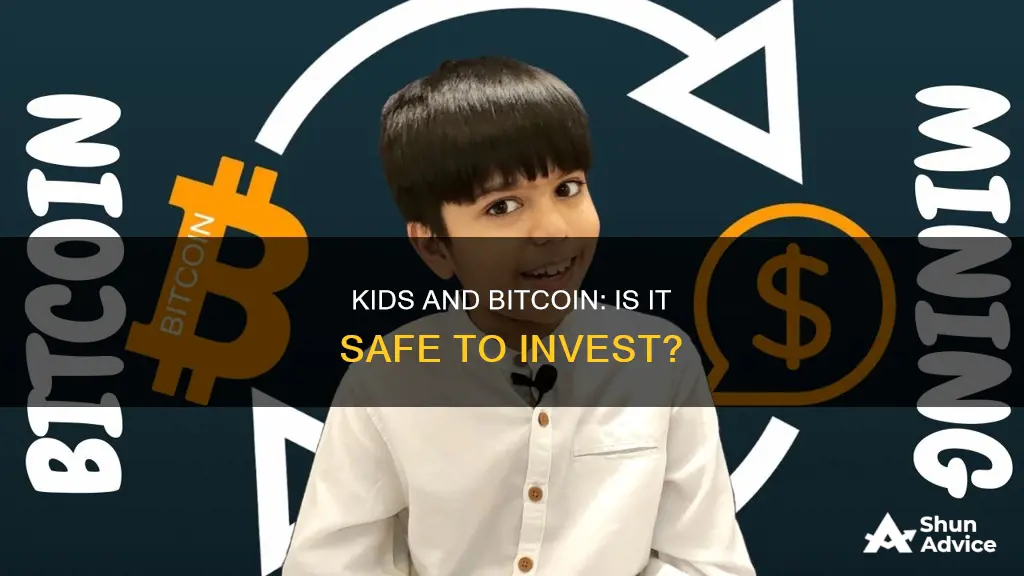
Investing in Bitcoin can be a great way to teach children about financial literacy and improve their financial future. However, there are some important considerations to keep in mind. For one, most crypto platforms require users to be 18 or older, so children cannot directly buy cryptocurrencies themselves. This means that parents or guardians will need to purchase and manage the crypto on their child's behalf, through a custodial account or similar setup. Additionally, cryptocurrencies are highly volatile and risky, so it's important to carefully weigh the benefits and drawbacks before investing.
| Characteristics | Values |
|---|---|
| Minimum age requirement | No minimum age to own cryptocurrency |
| Age restrictions | Most platforms require users to be 18+ |
| Custodial accounts | Adults can open a custodial account for a minor |
| Joint accounts | A parent can open a joint account with their child |
| Crypto wallets | Minors can technically have a crypto wallet, but most platforms won't allow it |
| Crypto volatility | High volatility, frequent price swings |
| Regulatory concerns | Lack of government or bank control, potential for future sanctions |
| Investment strategies | Diversification, long-term investment, compounding |
| Crypto education | Teaches financial literacy, risk management, blockchain technology |
What You'll Learn

Crypto for kids: the pros and cons
Cryptocurrency is a digital asset that is decentralised and uses cryptography to secure transactions. It is an emerging asset class that has become increasingly popular, with a total market capitalisation of over $2 trillion. While it can be a risky investment, some people are considering investing in cryptocurrency for their children's future. In this article, we will explore the pros and cons of investing in crypto for kids.
Pros
- Long-term growth potential: Cryptocurrencies like Bitcoin have seen significant growth over the years, and their value is expected to increase in the long term. By investing in crypto for your children, you can take advantage of the potential for high returns over time.
- Improving financial literacy: Involving your children in crypto investing can help them understand financial markets, risk management, and how to make sensible investments. It can also teach them about blockchain technology and the future of money.
- Early investment advantages: Kids have the most time on their side when it comes to investing. By starting early, they can benefit from the magic of compounding, turning small investments into substantial savings over time.
- Diversification: Adding crypto to your child's investment portfolio can provide diversification and reduce overall volatility. It is recommended to have a well-rounded portfolio with a small allocation to crypto, such as no more than 5%.
Cons
- Volatility: Cryptocurrencies are highly volatile, and their value can fluctuate significantly. This means there is a risk of large losses, and it may not be suitable for those with a low-risk tolerance.
- Scams and fraud: The crypto space is prone to scams, fake exchanges, phishing attempts, and pump-and-dump schemes. It is important to be cautious and only use trusted platforms to avoid falling victim to fraud.
- Regulatory concerns: Cryptocurrency is not regulated by governments or banking institutions, and its future is uncertain. There may be regulatory interventions that could impact the value and accessibility of crypto in the future.
- No inherent value: Cryptocurrency is based on speculation, and its value is determined by what people are willing to pay for it. Some experts believe that cryptocurrency has no inherent value, and its worth could drop significantly if people lose faith in it.
- Fees and taxes: Cryptocurrency transactions often come with fees, and these can add up over time. Additionally, there may be tax implications when buying, selling, or gifting crypto, so it is important to consult a tax advisor.
Investing in crypto for your children can be a complex decision with potential pros and cons. While it offers the opportunity for long-term growth and financial literacy improvement, it also carries significant risks and uncertainties. It is important to carefully consider your child's age, risk tolerance, and financial goals before making any investment decisions.
Why You Don't Need Bitcoin to Invest in Ripple
You may want to see also

How to open a crypto account for a minor
Yes, minors can invest in Bitcoin and other cryptocurrencies. However, they will need the help of a parent or guardian to set up a crypto investment account and buy cryptocurrencies. There is no minimum age requirement to own cryptocurrency, but most major crypto platforms require users to be adults.
- Decide on the type of investment account: Choose between a custodial account, joint account, or another type of account that allows the minor to earn crypto without directly buying it. Custodial accounts typically hold the same securities as a traditional brokerage account and are controlled by an adult but belong to the minor. Joint brokerage accounts are co-owned, with both owners having equal rights and say in investment decisions.
- Review the features: Consider the costs, investment selection, security, and crypto exchange being used. Look for low fees, the desired crypto coins, and a trusted and registered exchange.
- Submit an application: Provide basic identification information for both yourself and the minor. Fund the account with fiat currencies such as US dollars or euros, or accept contributions from other family members and friends as gifts to the minor.
Other ways for minors to hold crypto:
- Joint or custodial account: A parent or guardian can open a joint or custodial account where the minor can hold crypto.
- Apps: Some apps allow minors to earn crypto without purchasing it.
- Gifts: Adults can buy and hold cryptocurrencies themselves and then gift the fiat currency to minors once they become adults.
Important considerations:
- Volatility: Cryptocurrencies are highly volatile and unregulated, so there is no safety net if something goes wrong.
- Education: Educate minors about blockchain technology, risk management, and making sensible investments.
- Long-term investment: Consider the time horizon for the investment, as crypto is typically held for longer periods due to its volatile nature.
- Diversification: Crypto should be part of a well-rounded portfolio, with most experts recommending it comprise no more than 5%.
Examples of crypto accounts for minors:
- EarlyBird: A custodial account app that allows parents to invest in a range of assets, including Bitcoin and Ethereum, for a monthly fee.
- Step: A free hybrid Visa card that functions like a credit card, allowing minors to buy and sell Bitcoin and earn rewards. It also helps build a credit history and offers savings tools.
While it is possible for minors to invest in crypto, it is important to carefully consider the risks and ensure a thorough understanding of the market and blockchain technology. Parental guidance and oversight are essential when navigating this complex and volatile space.
Is Bitcoin Too Pricey to Invest in Now?
You may want to see also

Crypto exchange options for kids
Although there is no minimum age requirement to own cryptocurrency, most major crypto platforms and traditional brokerage firms won't allow minors to buy crypto until they become adults. Therefore, children will need the help of a parent or guardian to set up a crypto investment account. Here are some options for crypto exchange accounts for kids:
Custodial accounts
Custodial accounts are owned by minors but managed by parents or guardians. The UGMA (Uniform Gifts to Minors Act) and UTMA (Uniform Transfers to Minors Act) are common types of custodial accounts. Custodial accounts can hold stocks, bonds, mutual funds, real estate, and other types of investments.
Custodial accounts that support cryptocurrencies allow adults to make investment decisions on behalf of minors, and the assets are transferred to the child once they reach the age of majority (usually 18 or 21). Examples of platforms that offer custodial accounts for crypto include UNest and EarlyBird.
Joint brokerage accounts
Joint brokerage accounts are typically co-owned by spouses, but a parent can also open a joint account with their child. Both owners have equal rights and say in which investments to buy. Examples of platforms that offer joint brokerage accounts include Step and EarlyBird.
Crypto wallets
There are two types of crypto wallets: hot wallets and cold wallets. Hot wallets are online wallets connected to the internet, making them more convenient but also more vulnerable to hacks. Examples of hot wallets include web-based, mobile, or desktop wallets, as well as the Coinbase crypto exchange.
Cold wallets are offline wallets that are not connected to the internet, making them less convenient but more secure. Examples of cold wallets include hardware wallets such as the Ledger Nano S, as well as private and public keys written down on paper.
Crypto-related stocks
Teens can also invest in crypto-related stocks through custodial accounts set up by parents or other adults. For example, Coinbase Global Inc. (stock symbol: COIN) is a crypto exchange, so its value would be indirectly tied to the crypto market.
Crypto exchange-traded funds (ETFs)
Crypto ETFs are traded like stocks, and they are protected by the Securities Investor Protection Corporation (SIPC) in case the trading platform goes bankrupt. Examples of crypto ETFs include the Grayscale Bitcoin Trust ETF (GBTC) and the Bitwise Bitcoin ETF (BITB).
Bitcoin Investment: Is the Crypto Bandwagon Still Accessible?
You may want to see also

The risks of crypto for kids
While the world of cryptocurrency may be enticing to children and teens, there are several risks that parents and guardians should be aware of before allowing their children to invest.
Unregulated Nature of Crypto
The crypto sector is largely unregulated, and the value of each cryptocurrency is derived from the ongoing willingness of people to purchase and use it. In traditional finance, banks are legally obliged to inform investors of any risks that may reduce the value of their investment. However, in the crypto market, investors are left to fend for themselves, and irreversible and fast transactions mean buyers and sellers are very much on their own.
Volatility
Cryptocurrencies are a relatively new phenomenon, and their value is highly volatile. Crypto tokens can rapidly increase in value, but they can also plummet, leaving investors with worthless tokens.
Scams and Fraud
Children are particularly vulnerable to scams and fraud in the crypto space. Online predators often seek out inexperienced people to exploit, and children may fall victim to data breaches, identity theft, or fraud. Crypto scams increased in 2021, and children inexperienced in the sector are likely to be easy targets.
Loss of Private Keys
Children are also more likely to lose their private keys, which can result in the loss of their crypto funds.
Target of Criminals
Acquiring digital assets may make children a target for criminals. Until crypto exchanges implement stricter verification and authentication measures, children's privacy and funds will be at risk.
Blockchain Technology
The permanence and immutability of blockchain technology can also pose unintended consequences for minors. For example, the right to be forgotten, as outlined in the European Union's General Data Protection Regulation (GDPR), may conflict with the immutable nature of blockchain, where information recorded is permanent and cannot be deleted.
Financial Literacy
Children may not fully understand the complexities of the financial world and the risks associated with investing. It is important for parents and guardians to educate their children about financial literacy and the potential risks of investing in cryptocurrencies.
Bitcoin Investment Bots: How Long Do They Last?
You may want to see also

How to explain crypto to kids
So, you want to explain crypto to your kids? Here's how to do it in a way that's detailed, direct, instructive, and focused.
First, it's important to understand what cryptocurrency is and why it might be a good idea for kids to invest in it. Cryptocurrency, or crypto, is a type of digital money that uses blockchain technology to secure all transactions. It doesn't rely on a central authority like a bank to circulate; instead, it uses cryptography to secure transactions, making it resistant to hackers and counterfeiting. Anyone can view transactions on the blockchain, but no government or bank controls how crypto circulates, its value, or how it's exchanged.
Now, onto explaining crypto to your kids. Here are some key points to cover:
- Start by explaining that crypto is a type of money that exists online. It's like having a digital wallet with money that can be used to buy things, just like how they might use a debit card or Apple Pay.
- Emphasize the security aspect of crypto. Explain how blockchain technology makes it very secure and difficult for people to steal or tamper with. You can use the analogy of a safe with a very complex lock that only the owner can open.
- Talk about the value of crypto. Explain that, unlike regular money, crypto doesn't have a set value. Instead, it's worth whatever people are willing to pay for it. This can make it risky, but it also means that its value can increase over time.
- Discuss the benefits of crypto. One advantage is that it's easily accessible and can be used to make purchases worldwide without needing to go through a bank. Additionally, crypto can be a good way to teach kids about investing and financial literacy early on.
- Be honest about the risks. Explain that crypto is a volatile investment, which means its value can go up and down quickly. Let them know that there are also scams and fraudulent exchanges to watch out for.
- Give examples of popular cryptocurrencies like Bitcoin and Ethereum, and explain how they work. You can even show them how to set up a simple crypto wallet if they're old enough.
- Finally, talk about the future of crypto. Explain how more and more businesses are accepting crypto as a form of payment, and how blockchain technology is expected to expand its use.
Remember to keep the explanation age-appropriate and use simple language that your kids can understand. You can also use visual aids or drawings to help them visualize the concepts. By giving them a solid understanding of crypto, you'll be setting them up for a future where this technology is likely to play a significant role.
China's Bitcoin Investment: Exploring the Mystery
You may want to see also
Frequently asked questions
Kids can own Bitcoin, but they cannot buy it themselves. Most major crypto platforms require users to be 18 or older. A parent or guardian can buy Bitcoin for their child and put it in a custodial account, which the child will have access to once they turn 18.
You can open a custodial account at a bank or a crypto exchange. You will need to authenticate your identification, link your bank account, and deposit money into the crypto account.
Cryptocurrencies are among the riskiest investment options available. They are frequently made more dangerous by day trading practices that try to profit from volatility. Mishandling blockchain, excessive volatility, and the lack of strict crypto regulations are also risks.
Cryptocurrencies are likely to be a part of the future, so it is in your child's best interest to become familiar with them now. Teaching your child about crypto will give them a head start in understanding how it works and managing risk.
If you are hesitant about opening a crypto account for your child, you can consider investing in stocks, bonds, or mutual funds through a UTMA or UGMA account.







